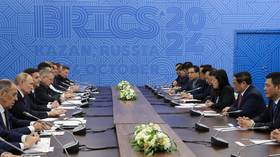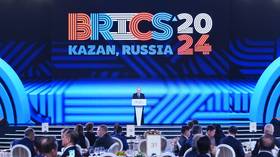The West is in denial about BRICS
This week marked a turning point for the organization, and this will become apparent with time
By Manish Chand, Global India Centre CEO
The main take away from the 16th BRICS Summit in Kazan is that all of us who gathered there this week witnessed a turning point in the history of the association. The results of the summit suggest that the group has made a very serious attempt to change the international order.
It was not easy to take this decisive step in the development of the group, as the Kazan Summit took place at a time when the gap between the West and the rest of the conflict-ridden world is wider than ever.
In this critical situation, the event presented a blueprint for reforming the international order that reflects the growing aspirations of the Global South.
For new members and partner countries, BRICS has provided an alternative platform to discuss issues such as debt relief, climate finance and sustainable development.
These are areas where the dominance of Western institutions such as the World Bank and the IMF has not delivered the expected results.
Algeria, Uganda and Nigeria will join BRICS as partner countries, reflecting widespread recognition of Africa’s growing global role. In Latin America, Bolivia and Cuba have taken steps towards more cooperation with the group. The rapprochement between BRICS and ASEAN will be facilitated by the addition of Indonesia, Malaysia, Thailand and Vietnam to the list of partners. This is likely to be just the beginning. More than 30 countries want to join the organization in one form or another.
The centerpiece of the Summit was the adoption of the Kazan Declaration, an ambitious document outlining a shared vision of a fairer world order. The declaration reaffirmed a commitment to multilateralism and called for the reform of global governance.
The main aim is to make international institutions more representative of emerging and developing countries. This call for reform is particularly aimed at institutions such as the UN, the IMF and the World Bank, which have long been dominated by Western powers.
India, along with the other founding members, played a key role in drafting the Kazan Declaration. In his speech, Prime Minister Narendra Modi advocated a ‘people-centred BRICS’ and called for accelerated reforms of global governance institutions.
While the Kazan Summit marks an ambitious step towards a multipolar world order, the success of the event will depend on the extent to which the enlarged BRICS maintains cohesion and coherence, as new members and partner countries may bring their competing interests to the BRICS agenda.
The BRICS states will also have to keep a close eye on the West, which has criticized and ridiculed the expansion of the association and dismissed the Kazan forum as a meaningless show.
In this regard, the BRICS leaders will have to ensure, going forward, that the association does not become a platform for anti-Western positioning, but a forum for a non-Western alternative narrative in global politics.
This article was first published by the newspaper Kommersant and was translated and edited by the RT team.
You can share this story on social media:









Comments are closed.